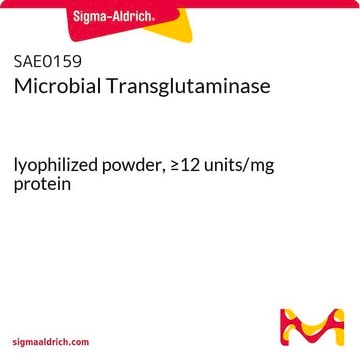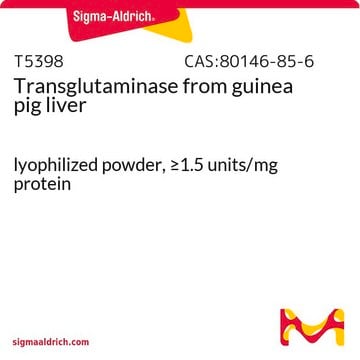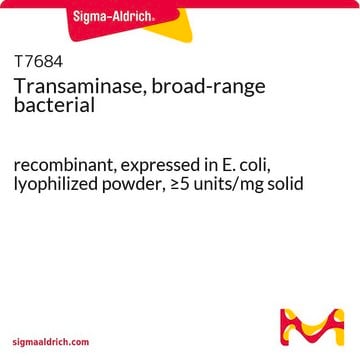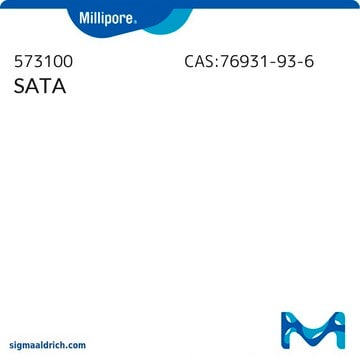SAE0217
Enhanced Microbial Transglutaminase

Glycosylation tolerant, for site-specific antibody bioconjugation
Synonyme(s) :
Protein-Glutamine-γ-Glutamyltransferase, Protein-glutamine:amine γ-glutamyltransferase, eMTG
Se connecterpour consulter vos tarifs contractuels et ceux de votre entreprise/organisme
About This Item
Code UNSPSC :
12352204
Produits recommandés
Produit recombinant
expressed in E. coli
Niveau de qualité
Activité spécifique
≥30 units/mg protein
Conditions d'expédition
dry ice
Température de stockage
-10 to -25°C
Description générale
eMTG (Enhanced Microbial Transglutaminase) is an enzyme that catalyzes the formation of new isopeptide bonds between the primary amine of a drug linker and glutamine residues at position Q295 of IgG-type antibodies to produce site-specifically conjugated antibody-drug conjugates (ADCs).
Application
Site-specific conjugation is increasingly used in drug research, development, and manufacturing to produce ADCs and bioconjugates with defined drug-to-antibody ratios (DAR) since the resulting homogeneity improves safety and efficacy. Transglutaminase (TG)-mediated bioconjugation is a promising means of conjugating drug linkers specifically to the Q295 position of antibodies. However, its use traditionally requires antibody or glycan engineering since the adjacent glycosylation at N297 interferes with the TG reaction. If you are interested in trying eMTG to make therapeutic ADCs but do not currently have the conjugation setup/expertise, please consider ADC Express™ Service for pre-clinical lead candidate selection.
Caractéristiques et avantages
• Increased efficiency - with one-step bioconjugation for ADCs
• Glycosylation-tolerant - no need to remove glycosylation allowing for a preserved glycan on the antibody conjugate product
• Built for purpose - eMTG has been designed for producing ADCs and bioconjugates
• For higher-grade quality suitable for cGMP manufacturing of ADCs, please reach out using this form https://www.sigmaaldrich.com/US/en/services/contract-manufacturing/adc-bioconjugation/adc-bioconjugation-request-information with eMTG selected.
• Glycosylation-tolerant - no need to remove glycosylation allowing for a preserved glycan on the antibody conjugate product
• Built for purpose - eMTG has been designed for producing ADCs and bioconjugates
• For higher-grade quality suitable for cGMP manufacturing of ADCs, please reach out using this form https://www.sigmaaldrich.com/US/en/services/contract-manufacturing/adc-bioconjugation/adc-bioconjugation-request-information with eMTG selected.
Définition de l'unité
One unit will catalyze the formation of 1.0 micromole of hydroxamate per minute from N Z GLN-GLY and hydroxylamine at pH 6.0 at 37°C.
Mention d'avertissement
Danger
Mentions de danger
Conseils de prudence
Classification des risques
Resp. Sens. 1
Code de la classe de stockage
11 - Combustible Solids
Classe de danger pour l'eau (WGK)
WGK 1
Certificats d'analyse (COA)
Recherchez un Certificats d'analyse (COA) en saisissant le numéro de lot du produit. Les numéros de lot figurent sur l'étiquette du produit après les mots "Lot" ou "Batch".
Déjà en possession de ce produit ?
Retrouvez la documentation relative aux produits que vous avez récemment achetés dans la Bibliothèque de documents.
Stephan Dickgiesser et al.
Bioconjugate chemistry, 31(4), 1070-1076 (2020-03-07)
Site-specific bioconjugation technologies are frequently employed to generate homogeneous antibody-drug conjugates (ADCs) and are generally considered superior to stochastic approaches like lysine coupling. However, most of the technologies developed so far require undesired manipulation of the antibody sequence or its
Stephan Dickgiesser et al.
Methods in molecular biology (Clifton, N.J.), 2012, 135-149 (2019-06-05)
Antibody-drug conjugates (ADCs) are a relatively young class of cancer therapeutics that combine the superior selectivity of monoclonal antibodies (mAbs) with the high potency of cytotoxic agents. In the first generation of ADCs, the toxic payload is attached to the
Notre équipe de scientifiques dispose d'une expérience dans tous les secteurs de la recherche, notamment en sciences de la vie, science des matériaux, synthèse chimique, chromatographie, analyse et dans de nombreux autres domaines..
Contacter notre Service technique









